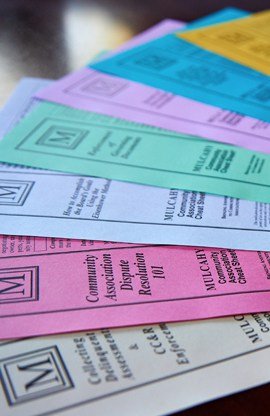PLANNING A BOARD MEETING CHECKLIST
Plan: Planning takes time, but planning will ultimately save time, and leading to better-informed and prepared boards and resulting in smoother meetings.
Determine the Best Meeting Time: Take into account the schedules of board members and association residents, and then choose morning, afternoon, evening, or a combination to obtain optimum attendance. Adopting a regular meeting location and time will also help obtain optimum attendance.
Provide 48-hour Notice and Agenda for All Board Meetings: Arizona law states that notice to lot/unit owners of all meetings of the board of directors, as well as meeting agendas, must be provided at least 48 hours in advance of the meeting by newsletter, conspicuous posting or any other reasonable means as determined by the board. (See below for emergency board meeting exception.)
The Notice: Date, time, location of the meeting and the purpose for which the meeting is called must be stated. Our firm suggests providing a detailed agenda with the notice of meeting to meet this purpose requirement.
Emergency Board Meetings: Do not require 48-hours notice if circumstances require action before notice can be given.
The Agenda: A properly planned agenda will provide organization and will can shorten the length of meetings. Our firm suggests providing a detailed agenda to help achieve these goals.
Use Board Packets: The community association manager and/or the designated board member should prepare and distribute board packets several days in advance of the board meeting.
A Board Packet should include…
- Minutes from the previous board meeting;
- Financial – reconciled bank statements, check registers, delinquent receivables, etc.;
- Committee information;
- Management and treasurer’s reports;
- Association correspondence, and;
- Most importantly, the meeting agenda.
Arrange the board packet in the same chronological order as the meeting agenda. Use colored paper or tabs to differentiate each section of the agenda. Label all items and place them in the agenda section/order in which they will be addressed.
Bring Supporting Documents: Managers should be prepared with a copy of the community’s Governing Documents, budget, resolutions, legal information, reserve information, board manual, and any records supporting the work of the association.
ANNUAL MEETING TIPS
Strategies that will help you obtain a larger turnout for your Annual Meeting:
- Announce the annual meeting date, time, and location according to association documents.
- Further announce via newsletters, bulletin boards, webpages, and sandwich boards, well in advance of the meeting date.
- Under Arizona Law: Provide notice of the meeting not fewer than ten or more than fifty days in advance, either by hand delivery or prepaid US mail; AND provide the agenda for the meeting by hand delivery, mail, website posting, email or other electronic means or posting at a community center or other similar location. A.R.S. Sections 33-1248(B) and 33-1804(B).
- Plan a social event before or after the meeting and include food.
- Give away door prizes.
- Conduct a raffle.
- Give away awards for best lawn, flowers, best holiday decorations, etc.
- Propose a discussion on hot topics such as crime or common area improvements.
- Aggressively pursue mail-in-ballots.
- Arrange for special guests or guest speakers.
- Acknowledge all of the volunteer work contributed by association members.
- Conduct all association meetings using an agenda and in a businesslike manner.
Annual Meetings are more productive and harmonious with planning:
- Obtain a quorum (check the bylaws – AZ law provides a default quorum of 10% if the documents are silent).
- Conduct registration 30 minutes prior to the start of the meeting.
- Divide rosters alphabetically among several tables; registrars work with the portion of the roster assigned to the table.
- Appoint a troubleshooter to handle anything that is out of the ordinary.
- Have sample registration materials, rosters, check in sheets, handouts, ballots.
- Plan for orderly distribution of materials.
- Appoint “inspectors of elections” to oversee the voting and election count (no inspector should have a vested interest in the election results).
- Create formal tally sheets for counting the ballots before the election.
- Count ballots with one group of inspectors and re-count with a different group.
- Completed tally sheets should contain: association name, meeting date, candidate names, results of election and signatures of the inspectors. Retain for permanent records.
